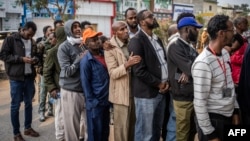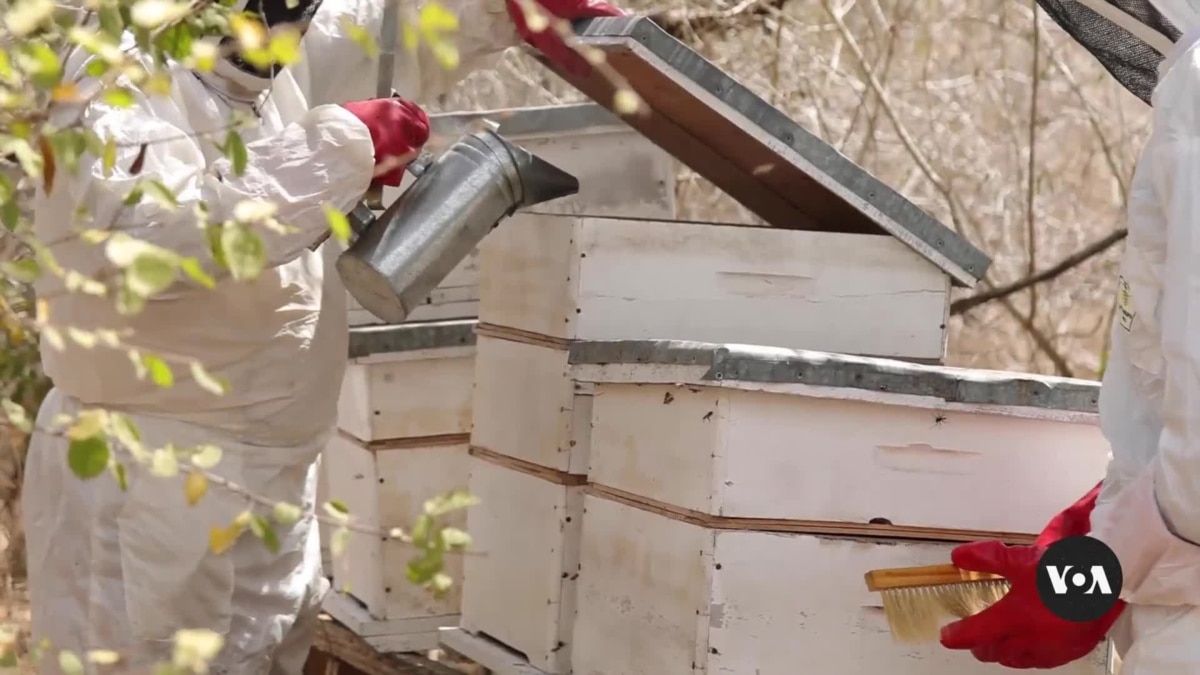Western diplomats have urged Somaliland's three presidential candidates and their supporters to accept the election results, expected in the coming days, as vote counting continues. The diplomats said they have visited 30 polling stations in different cities in Somaliland to "reaffirm their support for the democratic process."
The foreign diplomats from nine European countries and the United States, who were in Somaliland on Wednesday to witness the elections, said they commend Somaliland's National Electoral Commission for conducting a "transparent voter registration and candidate nomination process."
In a statement read by the U.K. ambassador to Somalia, Mike Nithavrianakis, the diplomats said they stand ready to work alongside Somaliland to further strengthen democracy and accountability in the future.
Meanwhile, international observers in Somaliland said the elections were peaceful, although in some parts the polling stations did not open "due to conflict."
Tim Cole, a former British diplomat, is the chief observer of the International Election Observation Mission Somaliland. He is leading a team of 28 international observers invited by the Somaliland election committee.
Cole said the observers visited 146 polling stations and saw "some administrative issues" and said in some places "procedures weren't followed." However, he said the team observed that in general, people wanted to participate in the election, there was enthusiasm for voting and the elections were peaceful.
"In some parts of Somaliland ... the polling stations didn't open because of conflict. So that's one issue that some voters faced," he told VOA's Horn of Africa Service.
"There were long queues, which can be seen as a good thing, but it also means people are standing around for a long time. But, yeah, the main challenges were really, I would say, there were some procedural issues. As I said, some of the polling stations, for example, didn't open as early as they should have done. They were due to open at 7 o'clock and they opened later. That was also true in the capital, Hargeisa."

The observer said the tallying starts when the ballot boxes are brought from all six regions of Somaliland. He said the results will take days to be released.
"It will be sometime next week before we know the final results," he said. "So, I'm not sure exactly which day that could be, because all of those things can take time or could be done very quickly depending on logistics, cars breaking down, all those sorts of things. That can happen in any country. So, it will be a few days yet before we get the final result."
The Brenthurst Foundation, a Johannesburg-based think tank that sent observers to Somaliland, said no serious incidents threatened the integrity of the election on voting day.
"In our opinion, this election was free, fair and credible despite the constraints of Somaliland's financial and institutional means," it said in a report published Friday.
More than 1.2 million people registered to vote in the election, the fourth in Somaliland since 2003. The region seceded from the rest of Somalia in 1991 but gained no international recognition. Somalia still considers Somaliland as part of its territory.
Guleid Ahmed Jama is a prominent Somaliland human rights lawyer and analyst. He says the economy, international recognition, foreign affairs, and peace and security were the main issues the candidates have been campaigning on.
"The economy of Somaliland is in a very poor position. Somaliland is a poor country; it's one of the poorest places in the world. It doesn't produce or manufacture anything. Most of the things, most of the goods used in Somaliland are imported from the outside," he said.
"Somaliland export is only livestock and also gets some money from remittance and by the diaspora community. So, its economy is very poor. That is an issue in Somaliland, particularly to the youth," Jama said.
Recognition is another key issue in Somaliland. The current president, Muse Bihi Abdi, signed a Memorandum of Understanding (MOU) with Ethiopia in January, agreeing to lease 20 kilometers of seafront to the landlocked country in return for recognition.
Jama said if the incumbent wins, he will implement the MOU. He said the opposition has welcomed the agreement, but with reservations.
"The political leaders, particularly two main contenders, are all on the same page to have some sort of agreement with Ethiopia in relation to access to [the] sea. But the opposition's position is that they will like to see the memorandum of understanding — what is written — because they haven't seen it. It is not a public document, and they say the people will be consulted and the process will be transparent," he said.
"But the ruling party candidate obviously says if he gets elected, he will convert it to a legally binding agreement. So, it depends on who wins in this election, whether they will proceed with the memorandum of understanding or not."
Somalia condemns the MOU as illegal and an infringement of its sovereignty and territorial unity, while Ethiopia and Somaliland defend it.
Without commenting on the MOU, Ethiopia praised Somaliland's election and congratulated the people of Somaliland "on the conduct of [voters for the] peaceful and democratic election."
In a statement issued by the Ministry of Foreign Affairs, Ethiopia commended Somaliland's National Electoral Commission for conducting a "free and fair election."
"This process reflects the maturity of Somaliland's governance and democratic system," the statement concluded.

 By Voice of America (Africa) | Created at 2024-11-16 02:31:55 | Updated at 2024-11-21 20:42:43
5 days ago
By Voice of America (Africa) | Created at 2024-11-16 02:31:55 | Updated at 2024-11-21 20:42:43
5 days ago







